The Democratic Cup wants to bring people together in conversation over a cup of coffee
It has been nearly two weeks since the 2016 presidential election was called in favor of Donald Trump. In those two weeks there have been protests, riots, and a rash of hate crimes some have said is worse than in the immediate aftermath of 9/11.
We have a long road ahead of us.
Ayumi Horie, co-founder of The Democratic Cup, sees this as “the long game.”
“It’s not like we can start organizing six months before the next election; we have to start now,” she says. “So much damage can be done in such a short amount of time.”
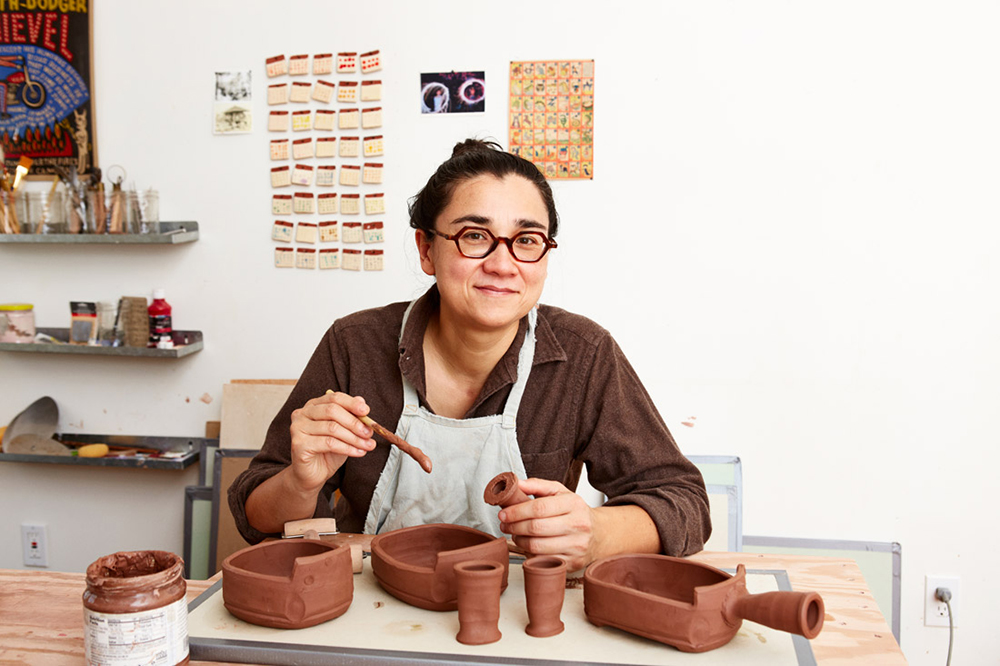
Horie, along with her fellow co-founder Nick Moen, created the concept of the Democratic Cup last spring as a response to the toxic rhetoric leading up to the 2016 election. Dismayed by the increasingly drastic polarization seen on both sides of the political spectrum, they envisioned the Democratic Cup as a way to bridge the gap over the simplest of things: a cup of coffee.
Both Horie and Moen are ceramicists. Horie, who based in Portland, Maine, gathered 32 of the best ceramic artists and illustrators across the country to collaborate on the cups, while Moen, based in Asheville, North Carolina, heads the fabrication team at his design production studio The Bright Angle.
As a potter, maker, and activist, the Democratic Cup is not Horie’s first foray into politically-motivated art. Her first politically-motivated project was eight years ago, during President Obama’s first presidential campaign. She curated a fundraiser called Obamaware, a fundraiser for Obama’s campaign featuring all Obama-themed artwork. That was followed by Handmade for Japan, a disaster relief fundraiser that raised more than $100,000 after the 2011 Tohoku earthquake and tsunami. After that, she says, her interests moved more towards social justice issues, and she is now a member of the Social Engagement Craft Collective.
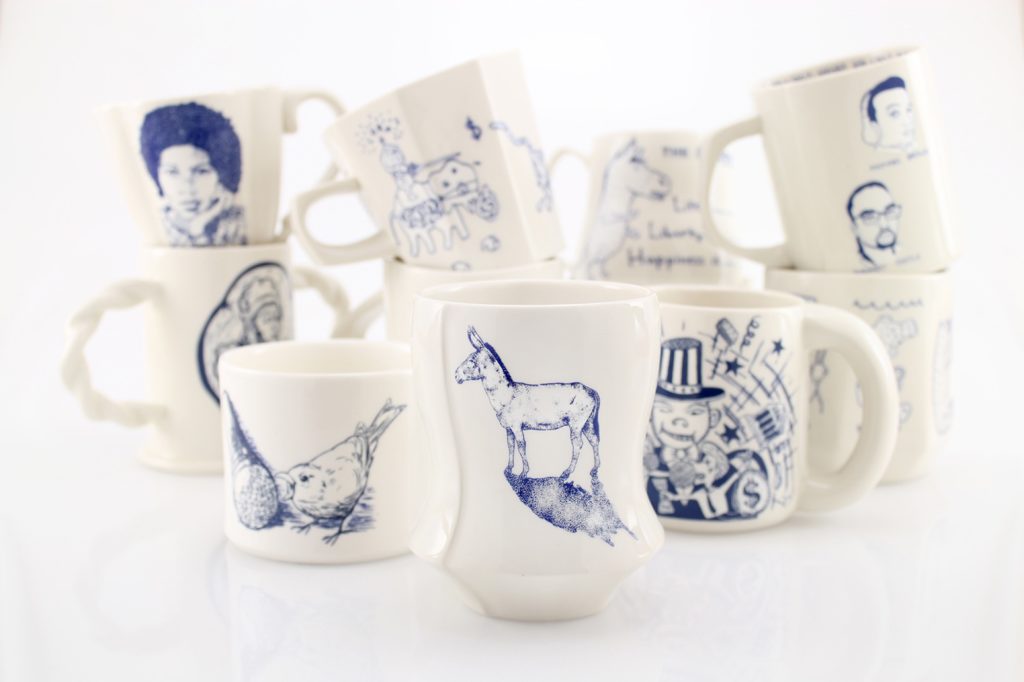
“I think with all these projects there has been some kind of imperative to use art to create a different kind of conversation,” she explains. “Pottery itself primarily exists in this domestic sphere. There’s a kind of intimacy that can happen in the kitchen that we’re trying to take advantage of, the ways that a cup as an object is, in a way, the most democratic of objects – everyone has one, and has a lot of them, and starts their day with them, so it felt like the right context to talk about political issues and the values that we hold.”
There are 22 different handmade designs they are selling online through the Democratic Cup website that cover a number of different issues, from immigration to LGBTQ rights to images of bell hooks, Sojourner Truth, and Ruth Bader Ginsburg (the latter being an even more socially relevant image now than when it was first designed). Klai Brown, Danez Smith, and Nick Moen designed a cup entitled “What Did I Do?” which features portraits of unarmed people of color – Sandra Bland, Michael Brown, Trayvon Martin, and Philando Castile, among others – who were killed by police in the past several years. Horie’s own Write-In Spin Cup, designed in collaboration with Birdie Boone of West Virginia, encourages the holder of the cup to articulate what life, liberty, and happiness are with a rounded bottom so it can be “spun” around from one person to another.
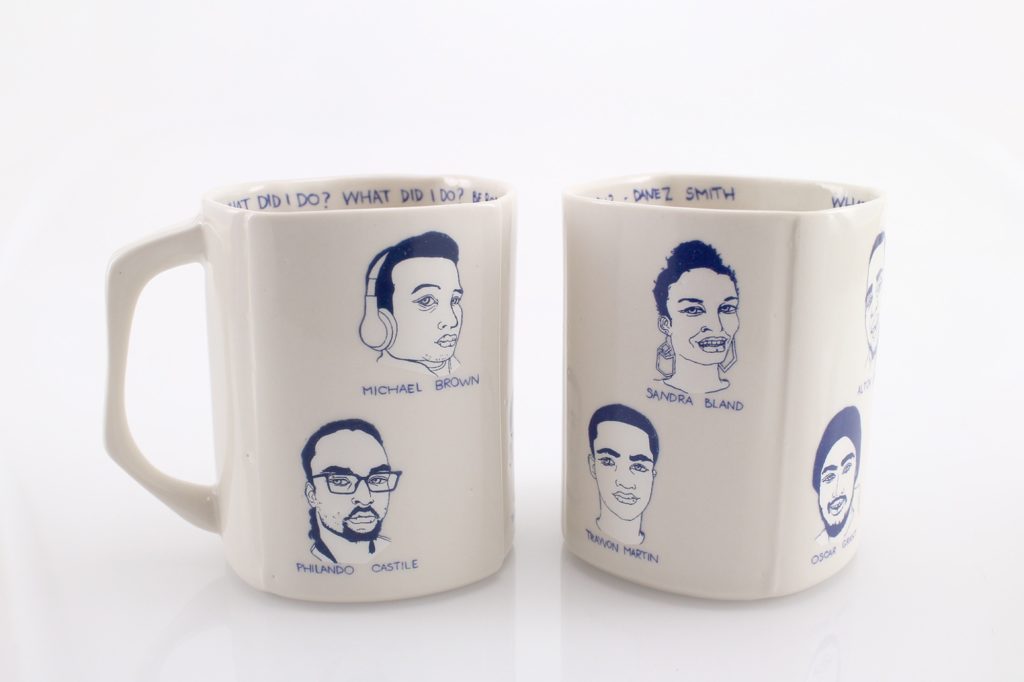
“There’s a way in which pottery functions on a day to day level that is different than public protest and political organization,” she says. “This project is sort of about slow activism. Initially it was about having civil discourse and talking about things in a deeper way so we can talk about issues rather than character and find some sort of understanding. We’re slowly trying to use this project as a way to catalyze conversation and mobilize progressive voices, because ultimately it’s these progressive values that matter no matter who is on the ticket.”
She believes people are more willing to let their guards down when they are at home, especially when talking among friends, and that even bridging gaps among ostensibly like-minded people is important now after this election as both parties are fractured within.
“There are a lot of conversations that can happen, both with people on opposite ends of the political spectrum but also with people you think you are on the same page with,” says Horie.
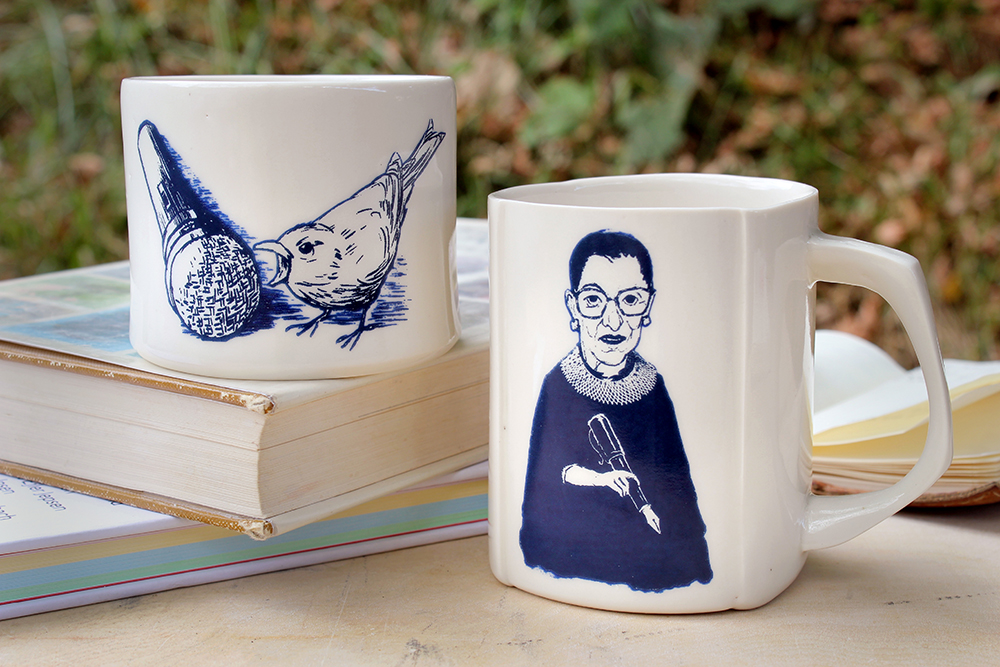
She continues, “This project is an attempt to cut through to our humanity. There has to be a common ground between all of us. Putting ourselves in someone else’s shoes is something that is one of our goals with this project, to truly sit down and listen to what our coffee partner is saying. It’s not just about arguing our points; it’s really about trying to understand where someone else is coming from.”
All of the proceeds from sales of the cups are donated to progressive nonprofit organizations (consider this for your holiday gift-giving – the “gift of conversation,” if you will), and Horie says the next step of the project is to focus even more on the social practice component by hosting events to get conversations started in a different way.
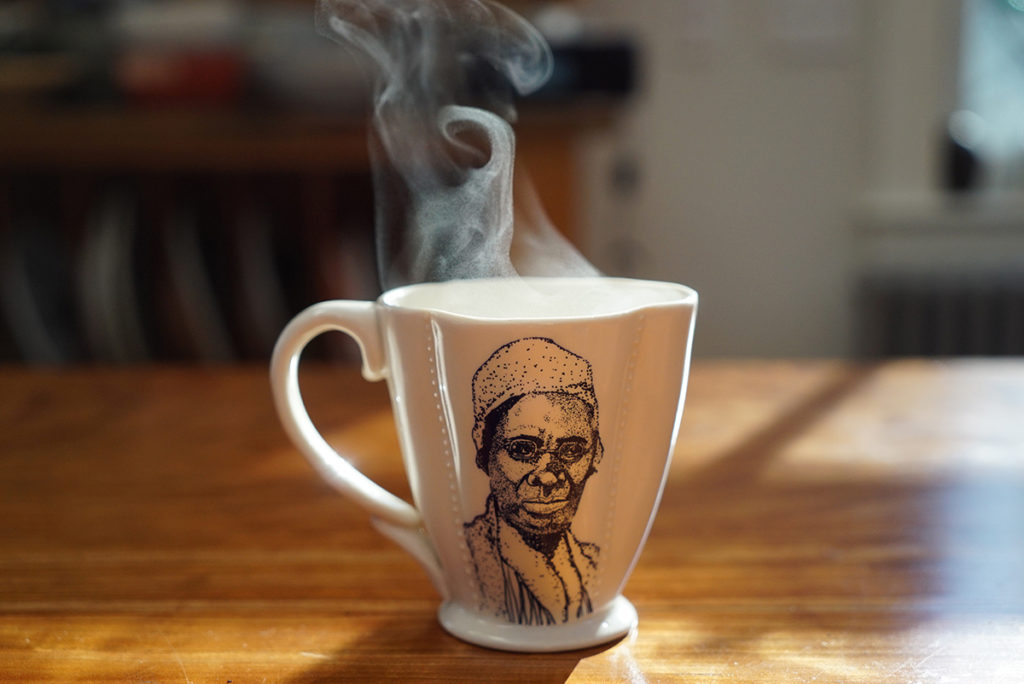
“Having a cup of coffee is a really easy place for these conversations to start,” she says. “We want people to be thinking about not just their own circumstances but what it means to be inclusive and what it means to be American and what it means to think beyond your own circle. I mean that just as much for people who have conservative values as well as for liberals. There’s no right answer with this project. We’re trying to deal with the discomfort with ourselves and the awkwardness of sitting and talking with somebody. There’s a way pottery can slow people down and allow them to be authentic in ways others don’t.”
She comments on how unabashedly earnest she sounds in describing this project, then reflects, “I feel like in this age of cynicism, a project that’s this earnest is really easy to dismiss. But in the end I don’t see any other way out of this mess we’re in than to become more human.”

(1) How do you like to collaborate?
I love collaborating with people who have a shared vision for a project and skills that dovetail with mine. In the case of The Democratic Cup, not being limited by geography (me in Maine and Nick and The Bright Angle in North Carolina) has made our collaboration possible. Technology has bridged the gap when we had to make aesthetic and visual decisions together. With several of our artists who hadn’t worked in ceramics before, I worked back and forth to adapt drawings to glaze material, so that the images would ultimately take advantage of properties unique to ceramics.
(2) How do you a start a project?
I always start with my heart. I have an imperative that I can’t let go of, until I see it realized and with the results of the election, it’s even clearer that we’re in this for the long game. Advocating for a project is easy when the mission is clear. Logistics and organization are equally critical, but they enter the equation later as ways to realize the bigger vision.
(3) How do you talk about your value?
Part of the premise of The Democratic Cup project is that every single person, voice, and conversation that happens over one of our cups is important. As artists, we make objects in which their value lies in how well they act as agents of change, whether it’s a shift in attitude or a call to action. This isn’t just about economic value; what we contribute to political discourse as artists is rich in emotional value because in the end, political values are spiritual values.
(4) How do you define success?
If, through this project, we help someone clarify their values, bolster their voice as an important part of democracy, or help foster one connection between people, then The Democratic Cup is a success. From the posts online and all the support we’ve gotten, I think we’ve achieved that, but that’s not to say that our work is done. In fact, this is just the beginning of a movement to create positive social change from the ground up.
(5) How do you fund your work?
We’ve funded this project in a variety of ways. The artists involved have all generously donated their time and work. However, we have also had considerable start-up costs, which have been funded by the United States Artist grant I received last year. We’re slowly paying back start-up and production costs through sales of cups, but the rest of the time that Nick and I have put in has been self-funded.

[…] it is important to them that their works demonstrate the value of artists and art to society. Ayumie Horie, co-founder of the Democratic Cup, says, “What we contribute to political discourse as […]